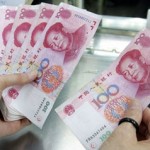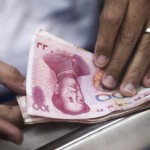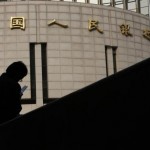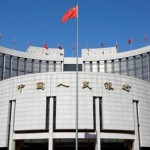China Foreign-Exchange Reserves Rise for First Time in Five Months
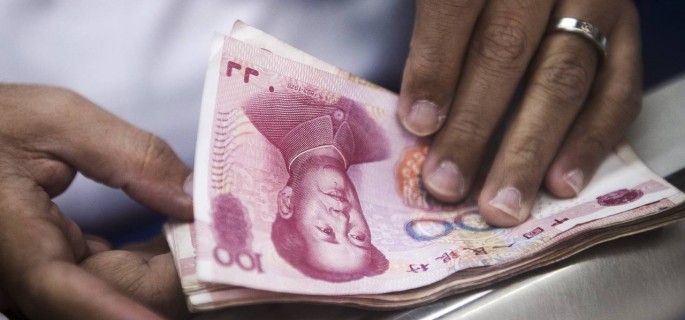
Increase comes as the yuan has staged a recovery in recent weeks
China’s foreign-currency reserves rose during March, the first increase in five months, a sign Beijing may have partially succeeded in stemming heavy capital outflows that destabilized global markets earlier this year and encouraged some investors to bet big against the yuan.
China’s foreign-currency holdings rose to $3.213 trillion at the end of March, up by $10.26 billion from the end of February, according to data from the People’s Bank of China.
The uptick comes as the yuan has staged a recovery in recent weeks. Its fall in the early days of 2016, following an earlier sharp devaluation last August, had led investors to worry Beijing was more concerned about the health of the world’s second-largest economy than it had previously let on.
In recent weeks, however, the yuan—which trades onshore in China within a narrow band around a value set daily by the central bank—has strengthened, and is now up 0.3% against the dollar in 2016.
The yuan’s improving health is partly thanks to the greenback’s relative recent weakness as the Federal Reserve has pared back expectations of how quickly it will raise interest rates this year. Meanwhile, recent data such as March’s purchasing-managers-index readings for the manufacturing and service sectors have suggested a slight recovery for China’s economy.

Even so, some prominent hedge-fund managers say they still expect the yuan to weaken longer term.
Kyle Bass, who runs Dallas-based Hayman Capital Management, said he hasn’t changedhis bearish position. “This is going to take years to play out, and monthly numbers don’t mean anything,” he said prior to the release of the foreign-exchange reserve data.
“The imbalances are just too large,” he said, adding that the rapidly growing money supply in China will eventually force the central bank to lower interest rates, putting downward pressure on the currency.
The Wall Street Journal reported in late-January that about 85% of Hayman Capital’s portfolio was invested in trades that are expected to pay off if the yuan and Hong Kong dollar depreciate over the next three years—a bet with billions of dollars on the line.
China’s foreign-currency holdings, much of which are invested in U.S. Treasurys, ballooned to around $4 trillion over the last decade, as the country’s export-driven economy grew rapidly.
But more recently its reserve levels had been declining, sparking worries that Chinese citizens were seeking to move money out of the country as China’s economic growth slows. China’s gross-domestic-product growth dropped to 6.9% in 2015, its weakest rate in a quarter-century, while capital outflows totaled around $676 billion during 2015, according to estimates in a recent report from the Institute for International Finance.
The new reserves data didn’t detail why they had risen last month, though analysts said the figures suggest billions of dollars of capital is still flowing out of China each month.
The dollar’s recent weakness likely boosted China’s reserves by around $45 billion, according to London-based Capital Economics, because its holdings in other currencies like the euro would now be more valuable in dollar terms.
Given that China also likely ran a trade surplus of around $25 billion last month, the reserves data imply there were still an estimated $60 billion of net capital outflows last month, it said. However, those outflows are around half the level seen in January, suggesting the yuan’s recent rise against the dollar “has shifted market expectations for the currency.”
Others said tighter capital controls enacted by Beijing this year, including limiting the supply of U.S. dollars that can be converted at banks and subjecting transfers overseas to greater scrutiny, may have helped stem capital flight.
Analysts also say the PBOC has increasingly turned to the derivatives market in recent months to prop up the currency. The strategy involves the central bank instructing state banks to borrow dollars that they subsequently sell. The PBOC then enters into forward contracts with the banks, which means it will take those trades onto its own balance sheet at a future date.
One advantage of using derivatives is that it means the PBOC doesn’t have to sell its foreign-currency reserves so much in the near term to support the yuan. The PBOC held $28.9 billion of “short” derivatives positions at the end of February—which represent future claims on its foreign-exchange reserves—according to central-bank data released last week.
Other fund managers who have recently taken short positions against Asian currencies included George Soros and William Ackman’s Pershing Square Capital Management LP. A spokesman for Soros Fund Management, Mr. Soros’s family office, declined to comment. Pershing said in January that it had “a large notional short position in the Chinese yuan” to hedge against “unanticipated weakness in the Chinese economy,” and a spokeswoman for the firm said Thursday that its stance hasn’t changed.
While many investors and economists remain concerned about China’s economic imbalances and the stability of its currency, “the very aggressive devaluation views these speculators had earlier this year have been abandoned for now,” said Paul Mackel, head of global emerging-markets FX research at HSBC.
In the options market, demand for placing bearish bets on China’s yuan against the dollar has “softened a lot” in recent weeks, Mr. Mackel said, as “a lot of these types of institutional investors have been rethinking” whether this is the right trade.
At Crescat Capital, a Denver-based hedge fund, shorting the Chinese currency “remains an important trade for us,” despite the losses it has incurred for the $87 million firm in March, said Kevin Smith, the firm’s chief investment officer.
“Whatever the Chinese have been doing has been working in the short run, but it’s not really sustainable in the long run,” he said. “You can’t keep printing money at the level they’re doing and not have it exert downward pressure on the currency.”
Source: WSJ









